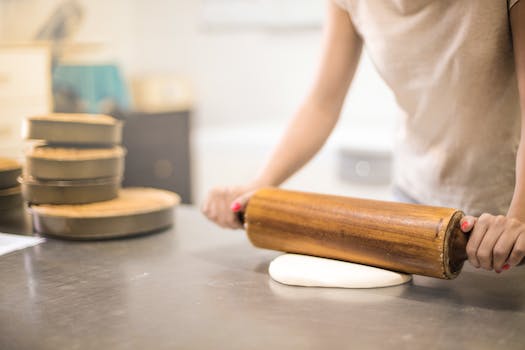How To Start A Baking Business
“From oven to success: A guide to starting your own baking business.”
Introduction
Starting a baking business can be a rewarding and profitable venture for those who have a passion for baking and entrepreneurship. However, it requires careful planning and preparation to ensure success. In this article, we will provide some tips on how to start a baking business, including market research, creating a business plan, obtaining necessary licenses and permits, and marketing your products.
Finding Your Niche in the Baking Industry
Starting a baking business can be a rewarding and fulfilling venture. However, before you dive in, it’s important to find your niche in the baking industry. This means identifying what sets your baked goods apart from others and who your target market is.
One way to find your niche is to focus on a specific type of baked good. For example, you could specialize in cupcakes, cookies, or bread. By honing in on one type of baked good, you can perfect your recipes and stand out in a crowded market.
Another way to find your niche is to cater to a specific dietary need. This could mean offering gluten-free, vegan, or keto-friendly options. With more and more people adopting specialized diets, catering to these needs can be a lucrative business opportunity.
You could also differentiate yourself by offering unique flavor combinations or using locally-sourced ingredients. By using high-quality ingredients and experimenting with new flavors, you can create a product that stands out from the competition.
Once you’ve identified your niche, it’s important to research your target market. Who are your ideal customers? What are their needs and preferences? By understanding your target market, you can tailor your products and marketing efforts to better appeal to them.
One way to research your target market is to conduct surveys or focus groups. This can help you gather valuable feedback on your products and identify areas for improvement. You could also attend local farmers markets or food festivals to get a sense of what types of baked goods are popular in your area.
In addition to researching your target market, it’s important to stay up-to-date on industry trends. This means keeping an eye on what other bakers are doing and attending industry events and conferences. By staying informed, you can adapt your business to changing consumer preferences and stay ahead of the competition.
Finally, it’s important to be passionate about your niche. Starting a baking business requires hard work and dedication, so it’s important to choose a niche that you truly enjoy. By pursuing your passion, you’ll be more motivated to put in the time and effort required to make your business a success.
In conclusion, finding your niche in the baking industry is a crucial step in starting a successful baking business. By focusing on a specific type of baked good, catering to a specific dietary need, or offering unique flavors and ingredients, you can differentiate yourself from the competition. It’s also important to research your target market, stay up-to-date on industry trends, and pursue your passion. With these steps in mind, you’ll be well on your way to starting a thriving baking business.
Creating a Business Plan for Your Baking Business

Starting a baking business can be a fun and rewarding venture, but it requires careful planning and preparation. One of the most important steps in starting a baking business is creating a business plan. A business plan is a written document that outlines your business goals, strategies, and financial projections. It serves as a roadmap for your business and helps you stay focused on your objectives.
To create a business plan for your baking business, you need to start by defining your business concept. What type of baked goods will you sell? Will you specialize in a particular type of baked good, such as cakes or bread, or will you offer a variety of products? Who is your target market? Are you catering to a specific demographic, such as health-conscious consumers or those with dietary restrictions?
Once you have defined your business concept, you need to conduct market research to determine the demand for your products. This involves analyzing your competition, identifying your unique selling proposition, and understanding your target market’s needs and preferences. You can gather this information through surveys, focus groups, and online research.
Next, you need to develop a marketing strategy that will help you reach your target market. This includes identifying the channels you will use to promote your business, such as social media, email marketing, and advertising. You also need to determine your pricing strategy, which should be based on your costs, competition, and target market.
Financial projections are an essential part of your business plan. You need to estimate your startup costs, including equipment, supplies, and rent. You also need to project your revenue and expenses for the first few years of your business. This will help you determine how much funding you need to start your business and when you can expect to break even.
Your business plan should also include an organizational structure and management plan. This involves outlining the roles and responsibilities of each member of your team, including yourself. You also need to identify any legal requirements for starting a baking business, such as obtaining permits and licenses.
Finally, you need to review and revise your business plan regularly. Your plan should be a living document that evolves as your business grows and changes. You should update your financial projections, marketing strategy, and organizational structure as needed to ensure that your business stays on track.
In conclusion, creating a business plan is a crucial step in starting a baking business. It helps you define your business concept, conduct market research, develop a marketing strategy, project your finances, and establish an organizational structure. By following these steps and regularly reviewing and revising your plan, you can increase your chances of success and achieve your business goals.
Setting Up Your Baking Business: Equipment and Supplies
Starting a baking business can be a fun and rewarding venture for those who love to bake. However, before you can start selling your delicious treats, you need to make sure you have the right equipment and supplies. In this article, we will discuss the essential items you need to set up your baking business.
First and foremost, you need an oven. This may seem obvious, but it is important to choose an oven that is suitable for your needs. If you plan on baking large quantities of goods, a commercial oven may be necessary. However, if you are just starting out, a standard home oven will suffice.
Next, you need mixing equipment. A stand mixer is a must-have for any baker. It will save you time and effort when mixing dough, batter, and frosting. You may also want to invest in a hand mixer for smaller jobs.
Baking pans are also essential. You will need a variety of sizes and shapes to accommodate different recipes. Consider investing in high-quality pans that will last longer and produce better results.
Measuring cups and spoons are crucial for accurate measurements. It is important to measure ingredients precisely to ensure consistent results. A digital kitchen scale is also helpful for measuring ingredients by weight.
A rolling pin is necessary for rolling out dough for pies, cookies, and other baked goods. A silicone mat can also be helpful for rolling out dough and preventing it from sticking to the counter.
Piping bags and tips are essential for decorating cakes and cupcakes. They come in a variety of sizes and shapes, allowing you to create intricate designs and patterns.
Other supplies you may need include parchment paper, baking mats, cooling racks, and a pastry brush. These items will make your baking process more efficient and help you achieve professional-looking results.
When it comes to ingredients, it is important to use high-quality products. This will not only improve the taste of your baked goods but also ensure that they are safe to consume. Some essential ingredients include flour, sugar, butter, eggs, baking powder, and baking soda. You may also want to invest in specialty ingredients such as vanilla extract, cocoa powder, and food coloring.
It is important to keep your ingredients organized and easily accessible. Invest in storage containers and label them accordingly. This will save you time and prevent confusion when baking.
In addition to equipment and supplies, you will also need to consider the legal aspects of starting a baking business. This includes obtaining any necessary licenses and permits, registering your business, and obtaining liability insurance.
Starting a baking business can be a fun and rewarding venture, but it requires careful planning and preparation. By investing in the right equipment and supplies, you can ensure that your baked goods are of the highest quality and that your business runs smoothly. Remember to always use high-quality ingredients and keep your workspace clean and organized. With dedication and hard work, your baking business can thrive.
Marketing Your Baking Business: Branding and Advertising
Starting a baking business can be a dream come true for many people who love to bake. However, it takes more than just baking skills to make a successful business. One of the most important aspects of starting a baking business is marketing. Branding and advertising are crucial to getting your business noticed and attracting customers. Here are some tips on how to effectively market your baking business.
Branding
Branding is the process of creating a unique identity for your business. It involves creating a name, logo, and overall image that represents your business and sets it apart from others. Your brand should reflect the values and personality of your business.
When creating your brand, think about what makes your baking business unique. Do you specialize in a certain type of baked good? Do you use only organic ingredients? Use these unique qualities to create a brand that stands out.
Once you have created your brand, use it consistently across all of your marketing materials. This includes your website, social media accounts, business cards, and packaging. Consistency is key to building brand recognition and establishing trust with your customers.
Advertising
Advertising is the process of promoting your business to potential customers. There are many different advertising methods to choose from, including social media, print ads, and word-of-mouth.
Social media is a powerful tool for advertising your baking business. Create accounts on popular platforms like Facebook, Instagram, and Twitter. Post pictures of your baked goods, share recipes, and engage with your followers. Social media is a great way to build a following and attract new customers.
Print ads are another effective advertising method. Consider placing ads in local newspapers or magazines. You can also create flyers and distribute them in your community. Make sure your ads are eye-catching and include your brand name and contact information.
Word-of-mouth is perhaps the most powerful advertising method of all. Encourage your satisfied customers to spread the word about your business. Offer incentives like discounts or free samples for referrals. Word-of-mouth advertising is free and can be incredibly effective in attracting new customers.
Networking
Networking is another important aspect of marketing your baking business. Attend local events and trade shows to meet other business owners and potential customers. Join local business organizations and attend networking events. Building relationships with other business owners can lead to valuable partnerships and collaborations.
In addition to networking with other business owners, it is important to build relationships with your customers. Offer excellent customer service and go above and beyond to make your customers happy. Encourage feedback and use it to improve your business.
In conclusion, marketing is a crucial aspect of starting a successful baking business. Creating a strong brand, advertising effectively, and networking with other business owners and customers can help you attract new customers and build a loyal following. With hard work and dedication, your baking business can thrive.
Managing Your Baking Business: Finances and Operations
Starting a baking business can be a dream come true for many people who love to bake. However, it takes more than just passion and skill to run a successful baking business. Managing your finances and operations is crucial to ensure that your business runs smoothly and profitably. In this article, we will discuss some tips on how to manage your baking business effectively.
Firstly, it is important to have a clear understanding of your finances. You need to know how much money you have to invest in your business, how much you need to spend on equipment, ingredients, and other expenses, and how much you expect to earn from your sales. You should create a budget and stick to it, keeping track of all your expenses and income. This will help you to identify any areas where you can cut costs or increase revenue.
One of the biggest expenses in a baking business is the cost of ingredients. You need to find a reliable supplier who can provide you with high-quality ingredients at a reasonable price. You should also consider buying in bulk to save money. However, be careful not to overstock as this can lead to waste and spoilage.
Another important aspect of managing your baking business is to keep your operations organized. You should have a system in place for ordering ingredients, preparing and baking your products, and delivering them to your customers. This will help you to streamline your operations and ensure that you can fulfill orders efficiently.
You should also consider investing in technology to help you manage your business. There are many software programs available that can help you with tasks such as inventory management, accounting, and customer relationship management. These tools can save you time and money, and help you to stay on top of your business operations.
Marketing is another important aspect of managing your baking business. You need to promote your products to attract customers and increase sales. You can use social media, email marketing, and other digital marketing strategies to reach your target audience. You should also consider participating in local events and markets to showcase your products and build your brand.
Finally, it is important to stay up-to-date with industry trends and regulations. You should be aware of any changes in food safety regulations, tax laws, and other legal requirements that may affect your business. You should also keep an eye on industry trends and adapt your products and operations accordingly.
In conclusion, managing your baking business requires careful planning, organization, and attention to detail. You need to have a clear understanding of your finances, keep your operations organized, invest in technology, market your products effectively, and stay up-to-date with industry trends and regulations. With these tips, you can run a successful and profitable baking business that brings joy to your customers and fulfillment to your life.
Conclusion
Conclusion: Starting a baking business requires careful planning, research, and dedication. It is important to have a solid business plan, obtain necessary licenses and permits, and invest in quality equipment and ingredients. Building a strong brand and marketing strategy can also help attract customers and grow the business. With hard work and a passion for baking, starting a successful baking business is achievable.





